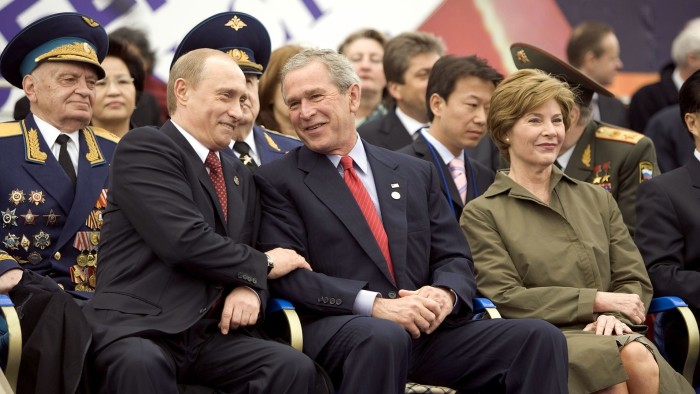Unlock the White House Watch newsletter for free
Your guide to what Trump’s second term means for Washington, business and the world
The writer is an FT contributing editor and writes the Chartbook newsletter
Next week marks the 80th anniversary of the surrender of Nazi Germany. On May 8 at one minute past 11pm Berlin time, the European theatre of the bloodiest war in human history fell silent. The occasion will, if Vladimir Putin means what he says, be marked by a temporary ceasefire in Ukraine, Europe’s bloodiest war of the last 80 years.
Anniversaries are arbitrary. They are no more inherently meaningful than birthdays, or the convention of reporting business results in calendar quarters.
Nevertheless, like birthdays or quarterly reports, anniversaries can be filled with meaning. They serve as collective chronological markers. When the nation bows its head to the Unknown Soldier or market commentators rush to get a common read on the non-farm payroll figures, their synchronised action defines them as a community.
Unlike birthdays, which celebrate the progress of a life, or data releases that define the shared moment, anniversaries bring the past into the present. They give force to William Faulkner’s famous line: “The past is never dead. It’s not even past.”
Ironically, this interplay of present-day concerns with the past will be all the more powerful the further removed we are from the event that we commemorate.
The centenary of the first world war came in 2014, shortly after Russia annexed Crimea. This gave the idea of “sleepwalking” into a European war huge resonance.
A year later, when it came time to commemorate the 70th anniversary of Allied victory in the second world war, even though it was the Soviet Union and China that paid the highest blood price, western governments downgraded their delegations to the parades in Moscow and Beijing. John Kerry, in classic Atlanticist mode, laid a wreath in Paris while Poland welcomed the UN secretary-general to Gdansk, where the first shots of the war were fired.
This year, coming up to the 80th anniversary, the second world war is slipping ever deeper into the past. For boomers and older members of Gen X this comes as a shock. One of the things that defined us as cohorts were the war stories and bomb sites we grew up among. The war felt “close”. The 80th anniversary marks our own ageing. And at the same time, in 2025, the sounds of the present are deafening.
What does it mean to commemorate history with — and in — Donald Trump’s America? Do we live in an era in which the historical narrative is being forcibly revised? Is the familiar heroic appeal to America’s global mission being replaced by a new isolationism born of resentment and insecurity? Or is the degeneration of US political culture so far gone that it puts in question sense making and collective rituals as such? It is hard to fathom, but while Trump likes military parades, he has a bad track record when it comes to honouring America’s fallen warriors.
Historical commemoration has always been a matter of power and politics. Public historical commemoration depends on what fits the prevailing narrative. On the 80th anniversary of the second world war, this has reached a delirious pitch.
In the 1980s, amid the cultural fluidity encouraged by postmodernism, one of the central anxieties was to preserve the status of the Holocaust as an event whose meaning must be solidly fixed. Since then, those doubts have been answered by a gigantic mobilisation of political and legal pressure.
But such historical fundamentalism applies highly selectively. While the meaning of the Holocaust is fixed, the ancient history of Gaza is reduced to rubble and its future reimagined as real estate fantasy. Meanwhile, the question of whether it was Russia that attacked Ukraine or Ukraine that started the war with Russia has been put up for grabs.
Putin’s May ceasefire is clearly intended to lure Trump to Moscow for Russia’s victory commemorations on May 9. In his typically gauche way, Trump has recently attempted to acknowledge the Soviet contribution to Allied victory. What kind of US delegation will attend the Red Square parade remains unclear. But the fact that no one can say with certainty how Trump will decide testifies to the degree to which our common understandings of history and politics are fraying.
Faced with Maga’s erosion of common sense, one can’t help wondering whether Faulkner’s line offers false consolation. Sometimes history does die. Sometimes the past is very much past.
Source link









